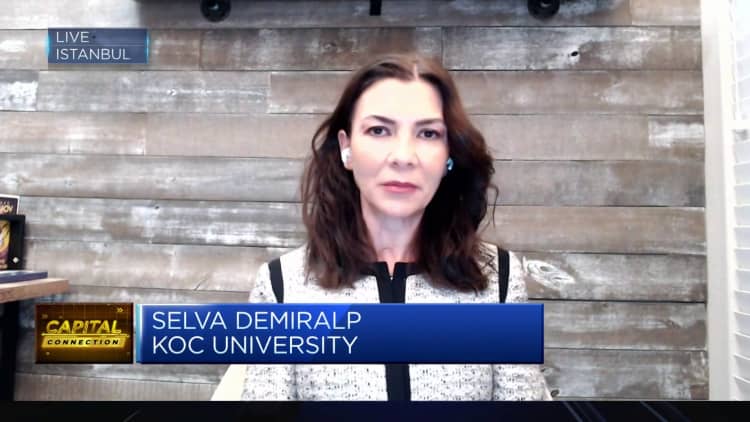Fatih Karahan, recently appointed governor of the Central Bank of Turkey, is seen in Ankara, Turkey, on February 4, 2024.
Emin Sansar | Anadol | Getty Images
Fatih Karahan, the newly appointed governor of Turkey’s central bank, has his work cut out for him, having been appointed to the post by presidential decree last weekend following the sudden resignation of his predecessor, Hafize Gaye Erkan.
A former deputy governor of the central bank, Karahan’s resume features years spent in major American institutions and companies. He earned a master’s and doctorate in economics from the University of Pennsylvania, spent nearly a decade as an economist at the Federal Reserve Bank of New York, worked as a part-time faculty member at Columbia University and New York University, and has held the role of a senior economist for Amazon.
It is hoped that the 42-year-old economist’s experience will serve him well as he leads the institution as it works to address the worrying inflation and cost of living crisis that has hit Turkey’s population of 85 million. The country’s currency, the lira, has fallen 38% against the dollar since the beginning of the year and has lost more than 80% of its value against the greenback over the past five years.
Turkey’s consumer price index was released on Monday and shows an increase of about 65% year-on-year for the month of January. Its central bank has made eight consecutive interest rate hikes since May 2023 – a total of 3,650 basis points – in a bid to curb soaring inflation. The latest rate hike, on January 25, raised Turkey’s benchmark interest rate by 250 basis points to 45%, although its leaders signaled at the time that the rate hike cycle had come to an end. .
While painful for the country, investors and economists say the rate hikes were necessary and that continuity in monetary policy priorities will generate confidence in the new central bank head.
In his statement published on Sunday on the Turkish Central Bank’s website, Karahan stressed that “price stability” is his team’s main priority, promising to “ensure disinflation” and “maintain the necessary monetary tightening until inflation it will not fall to levels consistent with our goal.”

“All eyes are now on new central bank governor Fatih Karahan,” Liam Peach, senior emerging markets economist at London-based Capital Economics, wrote in a note Monday. “As things stand, monetary policy continuity looks set to continue.”
Wolfgang Piccoli, co-president of consultancy Teneo, agrees.
“Like Erkan, Karahan is not a monetary economist, but is still considered a credible choice,” Piccoli wrote in an analysis for the firm.
“Unlike recent government changes, Erkan’s departure will not result in a dramatic change in policy position,” he said, adding that the central bank could still “adopt a more aggressive tone in terms of forward guidance to support Karahan in his new role”.
Unorthodox politics
Piccoli noted that Turkey’s monetary policy remains at the mercy of Turkish President Recep Tayyip Erdogan, who for years has frightened investors by stifling the central bank’s independence and preventing it from raising interest rates despite runaway inflation that at some point point exceeded 85%.
The more conventional policy approach, which began under Hafize Erkan and Turkish Finance Minister Mehmet Simsek, appointed last year, followed several years of unorthodox politics. Erdogan has already denounced interest rates as “the mother of all evils”, even as consumer prices have skyrocketed and the lira has collapsed.
Turkish Central Bank Governor Hafize Gaye Erkan answers questions during a press conference for the Inflation Report 2023-III in Ankara, Turkey, on July 27, 2023.
Anadolu Agency | Anadolu Agency | Getty Images
“Regardless of Karahan’s stature and the support provided by Treasury and Finance Minister Mehmet Simsek, Erdogan remains the ultimate decision maker,” Piccoli said.
“As long as the president remains supportive of the (gradual) turn to orthodoxy he advocated after the 2023 elections, the identity of the governor is almost irrelevant as the TCMB has weak (if any) institutional independence.”
Karahan “will still have to operate within the confines of a central bank that is neither independent nor equipped with adequate professionals,” Piccoli added. CNBC has reached out to Turkey’s central bank for comment.
Investor confidence in Turkey has improved over the roughly eight-month tenure of Hafize Erkan, who became the first female governor of Turkey’s central bank in June 2023. She resigned in a surprise announcement on Friday, saying that decision was due to a “reputation assassination” campaign and the need to protect his family.
Erkan, like Karahan, also has a resume that features elite American institutions; she has a PhD in financial engineering from Princeton and degrees from Harvard and Stanford business schools, and later worked at Goldman Sachs and First Republic Bank, the latter of which she was co-CEO. She also served on the board of directors of Tiffany & Co. and was named a director of Marsh McLennan, a professional services firm and a Fortune 500 company.